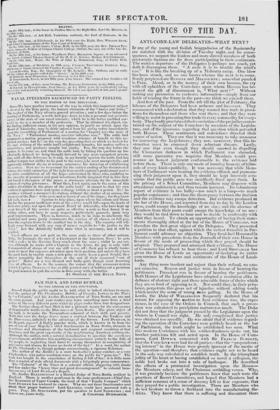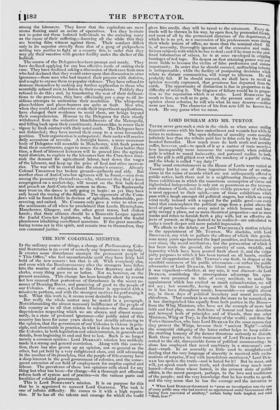TOPICS OF THE DAY.
ANTI-CORN-LAW DELEGATES—WHAT NEXT?
Ir any of the young and foolish braggadocios of the Squirearchy are satisfied with the division of Tuesday night, and its conse-
quences, We suspect the leaders and more shrewd members of both
aristocratic factions are fir from participating in their sentiments. The sudden departure of the Delegates is perhaps not much, yet cloth it discompose them. " A mote it is to trouble the mind's eye." It is like the breaking up of a 11Iahratta camp. One blow has been struck, and no one knows whence the next is to come.
Sorely perplexed are Russer.i. and MtmitouRNE ; somewhat puzzled is PEEL. Aloud, or in the secrecy of their own bosoms, the cry with all upholders of the Corn-laws upon whom Heaven has be-
stowed the gift of discernment is, " What next ?" Without making any pretension to exclusive infbrmation—simply from our habit of reading the future in the past—we think we can tell them.
And first of the past. From the 4th till the 21st of February, the labours of the Delegates had been arduous and incessant. They commenced with a declaration that they wanted free trade in provi- sions for themselves and those who sent them ; and that they were willing to assist in procuring free trade in every commodity thr every-
body. They loudly proclaimed their convictiot oft h e prei u d ie es el ter-
tained on the subject of the Corn-laws by members of the Legisla- ture, and of the ignorance regarding that question which pervaded both Houses. These sentiments and convictions directed their
course of action. They saw that it was necessary to take measures for instructing the Legislature ; they saw, moreover, that this in-
struction must be crammed down reluctant throats. Lastly, they saw that even though they should succeed in dispelling the Cimmerian darkness in which Parliament was shrouded, still some guarantee was requisite that :Members would pro- nounce an honest judgment conformable to the evidence laid before them. There is only one mode of insuring honesty of tribu- nals of every kind—publicity. It was necessary- that while 'Mem- bers of Parliament were hearing the evidence offered, and pronoun- cing their judgment upon it, they should be kept intensely con- scious that the public gaze was steadfastly fixed upon them. In the privacy of a Select Committee, Members may dispense with attendance undetected, and thus remain ignorant. Its voluminous report of' evidence is too bulky—too much in a lump—to reach popular cognizance ; and thus the discrepancy between the decision and the evidence may escape detection. But evidence produced at the bar of the House, and reported from day to day by the London press, could escape the knowledge of no tine; and the absence of Members from their posts could escape the knowledge of no one : they would be tied down to hear and to decide in conformity with what they heard. To obtain an opportunity of having their state- ments thoroughly sifted at the bar of the House of Commons, was therefore the first great object of the Delegates. They presented a petition to that effect, against which tine veriest formalist in Par- liament could advance DO objection. They furnished Honourable Members with precedents front the Journals of their own House in favour of the mode of' proceeding which they prayed should be adopted. They prepared and arranged their evidence. The House of Commons has refused to hear them : and Lord BaoronAy has given the House of Lords an opportunity of declaring its entire concurrence in the views and sentiments of the House of Land- lords.
Any thing more insolent and unjust than their refusal, we can- not conceive. Reason and justice were in favour of hearing the petitioners. Precedent was in favour of hearing the petitioners. Both Houses of the Legislature have adopted a resolution alike in defiance of abstract right and those miserable forms of theirs which they are so fond of opposing to it. Nor could they, in their petu- lance, perpetrate this gross act of injustice without adding words which render the sense of wrong more galling. In the House of Lords, the Duke of WELLINGTON frequently declared that his reason for opposing the tanotion to hear evidence was, the expe- rience, in the case of the Orders in Council, that such a prece- dent was calculated to precipitate matters too much. The Duke did not deny that the judgment passed by the Legislature upon the Orders in Council was right. He only complained that justice was obtained too speedily. He was afraid that if evidence regard- ing the operation of the Corn-laws were publicly heard at the bar of Parliament, the truth might be established too soon. What this modern Coriolanus with his soldier-frankness spoke out, his brother patricians felt and acted upon. In the House of Com- mons, Lord Hamel( concurred with Sir FRANCIS BURDETT, that the Corn-laws were bad for all parties—that the " preponderat- ing interest" in the House were grossly ignorant of the merits of the question—and therefore, that evidence ought not to be heard in the only way calculated to establish truth. In the triumphant jollity of his heart at having established so novel a syllogism, the noble lord broke out into a vein of burlesque. lie described the effects of a protracted investigation upon the House— the Members asleep, and the Chairman scribbling verses. Why, it was precisely because the petitioners knew that such were the practices of Secret Committees, and hoped that Members had a sufficient remnant of a sense of decency left to fear exposure, that they prayed for a public investigation. There are Members who do not hesitate to throw a firebrand into the manufacturing dis- tricts. They know that there is suffering and discontent there
among the labourers. They know that the capitalists are mere atoms floating amid an ocean of operatives. Yet they hesitate not to point out these isolated individuals to the enduring many as the cause of their suffering,—knowing all the while that they are bearing false witness against them. Their conduct differs only in its superior atrocify from that of a gang of pickpockets setting two parties to fight at a country Mir, in order that they may ply their vocation with greater facility under the shelter of the hubbub.
The course of the Delegates has been prompt and manly. They have declined applying for any less effective mode of stating their case. They have declined asking a discussion of their case from men who had declared that they would enter upon that discussion in utter ignorance—from men who had treated their prayers with derision, and sought to expose them to popular violence. They have refused to demean themselves by making any further application to those who scornfully refused even to listen to their complaints. Publicly they refused to do this ; and, by transferring the scat of their delibera- tions to the provinces, they have effectually put a stop to all in- sidious attempts to undermine their resolution. The whispering place-holders and place-hunters are quite at fault. Men who, when they could not otherwise evade their impertinent applications, have changed their residence to avoid them, are beings beyond their comprehension. Honour to the Delegates for their sturdy withdrawal from the seductive blandishments of. the Metropolis, and falling back upon their constituents, A ntams-like, to renew their vigour by fresh contact with their natal earth. • The Delegates have not disbanded; they have moved their camp to a more favourable position. Their organization is unimpaired ; their ranks will receive daily accessions of recruits. A fortnight hence, a more numerous body of Delegates will assemble in Manchester, with fresh powers from their constituents, eager to renew the strife. Even before that time, a flood of itinerant lecturers will be poured into the agricul- tural districts, to explain to the labourers how the Corn-laws dimi- nish the demand for agricultural labour, beat down the wages of the labourer, and keep up the price of' food and other necessa- ries. The war will be carried into the enemy's country. Already Colonel Tiro:arson has broken ground—gallantly and ably. But another class of Anti-Corn-law agitators will be found,—men from among the peasantry themselves,—who, whenever they find a knot congregated on a market-day, will mount on the first bulk-head and preach an Anti-Corn-law sermon to them. The Squirearchy may trust us, the dance is only going to begin : as yet they have only heard the tuning of the fiddles. The opponents of the Corn- -laws will be found fertile in devices of agitation, indomitable, per- severing, and united. Mr. COBDEN only gave a voice to what are the sentiments of all when he proclaimed that Leeds, Birmingham,
Manchester, Glasgow, and the other great towns, had shaken hands ; that their alliante should be a Hanseatic League against the feudal Corn-law legislators, who had succeeded the feudal plunderers inhabiting castellated mansions. If the great manufac- turing towns act in this spirit, and remain true to themselves, they can command justice.



























 Previous page
Previous page